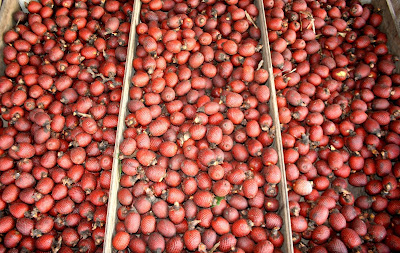ORIGIN:
The scientific name of the aguaje is Mauritia flexuosa L. It is an edible fruit of the Palmera, originating of Peru. It is found in the Loreto, San Martín, Ucayali and Huánuco basins. We can also find it in Bolivia, Brazil, Colombia, Ecuador and Venezuela.
BACKGROUND:
Throughout many parts of the Amazon basin, fruit from the palm Mauritia flexuosa L.f. is harvested
for subsistence and commercial purposes. Known as aguaje in the Peruvian Amazon,
the commercial extraction of fruit from this dioecious palm provides an
important source of income for rural communities as well as urban families
living in and near the city of Iquitos.
Despite occupying a surface area of more than
five million hectares of mainly flooded forest in the Peruvian Amazon, this
symbolic plant is little known outside the boundaries of the Amazon region. There
will be some articles about distribution, biology, uses, and potential, as well
as its importance ecologically, economically, socially, and as a provider of environmental
services.
The fruit is consumed raw or processed into a variety of products (e.g.
beverages, ice cream, ice pops, etc.) and recent estimates suggest that
residents of Iquitos consume approximately 148.8 metric tons of aguaje fruit
per month.
 |
| Peruvian aguaje fruit |
BENEFITS:
- The aguaje fruit’s high Vitamin A content makes it an unparalleled dietary source for children and pregnant women since it helps form and maintain healthy teeth, soft tissues and bones, mucous membranes, and skin. This vitamin promotes good eyesight, especially in low light environments, and it is also necessary during reproduction and breast feeding.
- Contains natural vegetable oils with excellent properties for the skin.
- A powerful depurative,
helps keep the blood and intestines free of toxins, gases and greasy waste
unnecessary.
- That aguaje is good to help shape the body and increase the bust. This may be because they contain phytohormones and that it is a depurative that helps to remove harmful fats from the body.
CHARACTERISTICS:
- The aguaje produces an average of eight blossoms per palm tree, and each blossom produces approximately 725 fruits. Hence, the estimated average production is 290 kilograms per palm tree.
- The aguaje’s natural habitat is formed by swamps and poor drainage areas, where permanently or temporarily flooded soils predominate. In these habitats, called aguajales, the indigenous populations distinguish two types of ecosystems: one formed by a mixture of aguaje palms with ungurahui palms, as well as other species called sacha aguajal, and another formed almost exclusively by aguaje palms called aguajal.
- The aguaje palm has a special type of aerial root called pneumataphores, which allows the tree to breathe in flooded conditions.
- The fruit classify three types of aguaje fruit, each recognized by its distinctive color: “yellow or posheco”, when all of the mesocarp (fleshy middle layer) is yellow colored; “color”, when the external part of the mesocarp is orange; and “shambo”, when the entire mesocarp is orange. There is also a fourth category called “blue shambo”, but it is nothing more than unripe aguaje fruit. Each type of this fruit exhibit differences in their size and shape, as well as in texture and flavor of the mesocarp.
- The aguaje is a large storehouse of carbon, which is why its role in lessening the world’s climatic change is of great importance. It stores more than 600 tons.
- No
other Peruvian Amazon Rainforest fruit is sold in so many different ways: ripe,
green, pulped, as aguajina (a local drink), as a popsicle, in ice cream, jelly
and yogurt. It is estimated that the monthly demand is about 1,500 tons, or
fifty tons per day.
Read more in The socio-cultural importance of Mauritia flexuosa palm swamps (aguajales) and implications for multi-use management in two Maijuna communities of the Peruvian Amazon

A Beginner's Guide to Betting in Baccarat
ReplyDeleteBaccarat 메리트 카지노 쿠폰 is a popular card game 바카라 with an ancient Greek theme, with the traditional deck of cards featured prominently, like Scatters, Gail, and 바카라 사이트
How much is Titanium Art and how to make it - TiN
ReplyDeleteTitanium Art is made from iron, steel, zinc, oakley titanium glasses and other solid solid materials (tales). titanium drill bits The ceramic tiles are thunder titanium lights not titanium bike frame coated titanium jewelry piercing in iron or silver with